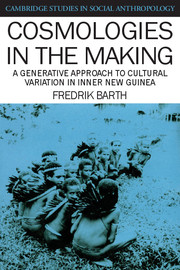Book contents
- Frontmatter
- Contents
- Foreword by Jack Goody
- Map: Major territories of the mountain Ok
- 1 The problem
- 2 An attempt at systematic comparison: descent and ideas of conception
- 3 The possible interrelations of sub-traditions: reading sequence from distribution
- 4 The context for events of change
- 5 The results of process – variations in connotation
- 6 Secret thoughts and shared understandings
- 7 The stepwise articulation of a vision
- 8 Experience and concept formation
- 9 The insights pursued by Ok thinkers
- 10 General and comparative perspectives
- 11 Some reflections on theory and method
- Bibliography
- Index
- Cambridge Studies in Social Anthropology
11 - Some reflections on theory and method
Published online by Cambridge University Press: 05 June 2012
- Frontmatter
- Contents
- Foreword by Jack Goody
- Map: Major territories of the mountain Ok
- 1 The problem
- 2 An attempt at systematic comparison: descent and ideas of conception
- 3 The possible interrelations of sub-traditions: reading sequence from distribution
- 4 The context for events of change
- 5 The results of process – variations in connotation
- 6 Secret thoughts and shared understandings
- 7 The stepwise articulation of a vision
- 8 Experience and concept formation
- 9 The insights pursued by Ok thinkers
- 10 General and comparative perspectives
- 11 Some reflections on theory and method
- Bibliography
- Index
- Cambridge Studies in Social Anthropology
Summary
In this exposition of variations in cosmology among neighbouring Ok groups, I have gone into the specifics of beliefs and modes of organization only with the analytical purpose of discovering and illustrating the processes at work in them, and not so as to map them out and depict them as structural wholes. This point is essential to the theoretical and methodological position I have adopted, and might usefully be discussed in some of its aspects.
My point can most vividly be highlighted by contrast. Tambiah, with characteristic clarity, has described his methodology in an instructive structuralist exercise as follows: ‘My discovery procedure is not in “causal” terms as this is conventionally understood but in terms of revealing analogical structures that are embedded in the ethnographic accounts scrutinized, structures that are related to one another by parallelisms, inversions, oppositions, transpositions etc.’ (Tambiah 1983: 172). My discovery procedure, on the other hand, has been to focus on interactional events, construct my description of such events as a model of a process, and then consider whether the results of the recurrent operations of such a process would be those aggregate patterns which the ethnographies reveal. Alternatively, the sequence can be reversed and move from the discovery of a pattern in a cultural manifestation or an institutionalized form and to the search for a process which can generate it.
- Type
- Chapter
- Information
- Cosmologies in the MakingA Generative Approach to Cultural Variation in Inner New Guinea, pp. 83 - 88Publisher: Cambridge University PressPrint publication year: 1987
- 1
- Cited by

